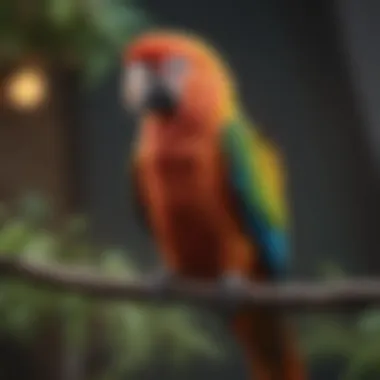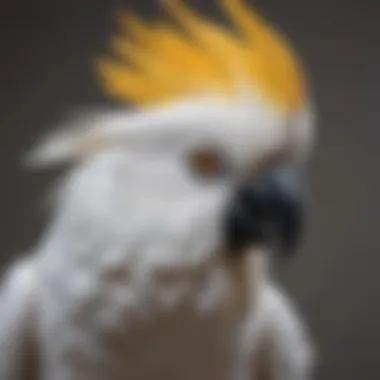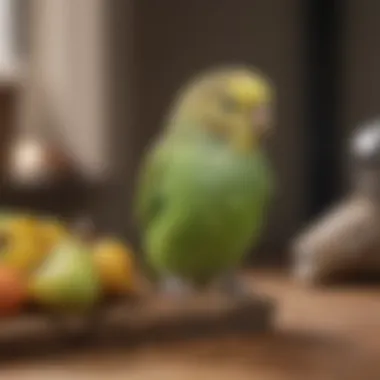Ultimate Pet Bird Naming Guide with Visual Insights


Intro
Choosing a name for your pet bird can be a unique experience that goes beyond simply picking a sound. Names reflect the personality, species, and even the owner's aesthetics. The naming decision can set the tone for the bond you share with your feathered companion. Engaging with names that resonate allows for a more personal connection and enhances communication between you and your bird.
Birds, unlike traditional pets such as dogs and cats, often require a more nuanced approach to naming. Different species exhibit diverse traits, behaviors, and sounds, making it crucial to understand their inherent characteristics. Visualization plays an important role here. For instance, seeing a picture of a vibrant macaw alongside segmented categories of names can help identify the focal point when deciding.
Beyond the aesthetics, societal and cultural influences often dictate optimal names for pet birds. This guide aims to address many angles including the origins of names, their meanings, and relevant issues surrounding naming conventions. By delving into these areas, readers will gain insight not only into the naming process itself but also why some names may resonate more than others.
As we explore various sections, it's essential to understand the broader context of caring for your pet before focusing on name selection. After all, understanding your bird's needs helps shape a fitting name that accurately reflects rather than contrasts with its unique nature.
Understanding the Importance of Bird Names
Naming a pet bird is not merely a task of assigning a label. It transcends that; it becomes a crucial element in the relationship between the bird and its owner. This section explores why understanding bird names holds significant importance in the context of pet owner dynamics.
Cognitive Connections and Identity
Birds, much like humans, develop an identity shaped by their interactions with their environment and the beings around them. A name serves as a mnemonic device, anchoring them to particular memories and encounters. It imbues the bird with a sense of personal identity amidst its unique traits.
Studies indicate that animals often respond to names, recognizing them as part of social communication. This recognition may help strengthen their cognitive function. A name can reflect the character traits of a bird and adheres to the behavioral patterns it displays, whether that be a curious parrot or a shy canary. Ideally, the name created by an owner not only suits the bird but fosters trust and bonds that lay the foundation for their future interaction.
The Role of Names in Bird Interaction
A name influences how an owner communicates and engages with their pet. For instance, a distinct name will be accompanied by specific calls, cues, and behavioral expectations. Owners often use names to reinforce training routines, underline affection, or communicate boundaries. The result is an arsenal of harmonized verbal incentives aiding in building effective communication.
Each time a name is spoken, it can solidify both recognition and response from the bird. This reinforces the position of trust, building an emotional connection as it begins associating its identity with the sound and context of that name. Furthermore, it allows the bird to seamlessly integrate into household routines and the family environment. In essence, by employing a suitable name, an owner provides more than a choice; they offer stability and familiarity.
A meaningful name can significantly deepen the emotional connection between a bird and its owner, thus enriching the experience of avian companionship.
Understanding how names function goes beyond mere choice; it reveals the profound human-bird dynamics within domestic settings. The significance of choosing an appropriate, reflective name cannot be overstated, as it lays the groundwork for a fulfilling relationship. Recognizing these connections streamlines the endeavor of labeling pet avians, making this guide an invaluable resource for prospective bird owners.
Bird Species and Their Popular Names
Naming your pet bird is a significant step in establishing a connection with your avian companion. The name often reflects the bird's species and its specific characteristics, making it an important aspect of pet ownership. Selecting a meaningful name can enhance your relationship with your bird, ensuring that your pet feels recognized and acknowledged. In this section, we explore how various bird species influence naming trends and how popular names cater to their unique attributes.
Common Species and Name Trends
Common bird species such as Budgerigars, Cockatiels, and Canaries often govern the popular name trends seen today. Each species carries distinctive traits that naturally inspire names. For instance, Budgerigars, known for their sociable nature, are frequently given playful names reflective of their friendly behavior. Popular choices for Budgies might include names like Sunny or Feather.
Similarly, Cockatiels with their signature crests may tend to receive more whimsical names, drawing inspiration from their artistic charm. Names such as Picasso or Matisse reflect both the artist's spirit and the bird's appearance.
Key Trends: These are some considerations when choosing names for common species:
- Explore names that reflect personality traits.
- Choose names inspired by color or physical features.
- Reflect on themes related to music, considering their vocalization.
In addition to individual traits, trends can also surface in short lists shared by owners in various communities, both online at platforms such as Reddit and Facebook. Bird lovers discuss the names they choose and observe the latest fads which may include names resembling celebrities, cartoon characters, or food items.
Exotic Birds and Unique Naming Conventions
When it comes to exotic birds, naming conventions often deviate from common trends. Owners tend to embrace the novelty and distinctiveness these birds represent. Species like Macaws, African Greys, and Eclectus Parrots lend themselves to names containing majestic or exotic meanings, paying homage to their stunning beauty and rarity. Names can range from Talon to Nala, encapsulating a relational yet ethereal quality for these avian species.


Also, individual characteristics from exotic birds can dictate more creative naming approaches. For example, if you own a Macaw with flamboyant colors, a name like Rainbow may seem fitting. That naming fosters a connection between the name and the bird’s visual appeal.
Unique Strategies for Naming Exotic Birds:
- Innovate names inspired by their geographic origins. Connect more deeply by understanding the heritage.
- Choose names reflecting behaviors or your experiences with the bird.
- Allow for creativity, enabling naming that feels personal.
In summary, pet bird naming takes careful consideration. Both common and exotic bird naming conventions derive considerable insight from individual traits and species characteristics. This approach can alienate or connect owners more deeply with their companions.
Naming Based on Personality Traits
Naming based on personality traits is a crucial aspect of selecting a name for your pet bird. Understanding the unique characteristics and behavior of birds can immensely enhance the naming process, allowing chosen names to resonate with the bird's inherent nature.
In this section, we will delve into three distinct personality categories—friendly and sociable, quiet and reserved, and playful and mischievous. Recognizing these behaviors helps in assigning names that feel fitting and genuine, contributing to the overall bond between the owner and their feathery companion.
Friendly and Sociable Birds
Friendly and sociable birds are typically characterized by their outgoing nature and willingness to interact with their human companions. These birds often enjoy human contact and thrive in social settings. Examples of friendly birds include parrots like the cockatiel and budgerigar.
When it comes to naming these types of birds, it is beneficial to consider names that reflect their lively personalities. Here are a few ideas:
- Buddy
- Sunny
- Chip
- Bella
- Tiki
These names usually carry a certain warmth or cheerfulness, matching the bird's friendly disposition. The chosen name should facilitate an emotional connection, making it easier to reinforce desired behaviors and enhance communication.
Quiet and Reserved Birds
On the contrary, quiet and reserved birds exhibit gentle and calm personalities. They may not seek out interaction as eagerly as their more extroverted counterparts. Species like finches and doves often display these traits. Such birds can exhibit poignant beauty in their tranquility, possibly offering moments of reflection and solace.
Selecting names for quiet birds can be more subdued. Potential names include:
- Willow
- Sage
- Luna
- Misty
- Ash
These names resonate with calmness and provide an acknowledgment of the bird's serene nature. They also allow owners to instill a sense of comfort in interaction, respecting the pet's reserved personality.
Playful and Mischievous Birds
Lastly, birds that are playful and mischievous often attract attention with their oafish antics. Parrots, especially species like the African Grey and Indian Ringneck, exemplify this spirited trait. Their energy can liven any room, delighting their owners.
Choosing names for these birds can embrace their carefree and sometimes cheeky behavior. Suitable names might include:
- Rascal
- Ziggy
- Peanut
- Buddy
- Dash
These names convey a sense of fun and spontaneity. They encourage play and interaction, allowing the owner to celebrate the bird's spirited nature while reinforcing positive engagement.
In summary, understanding your bird’s personality is key to selecting an appropriate name. Names that align closely with traits not only help in communication but also foster a deeper relationship between the owner and the bird. By being mindful of your pet's character, you can enhance both naming significance and the emotional bond you share. > "The right name can bridge the connection between a bird and its owner, establishing mutual understanding."
Cultural and Historical Influences on Bird Names
Bird names hold significant weight beyond mere identification. They often reflect cultural contexts and historical backgrounds. This dynamic aspect not only connects birds with specific identities, but it also provides greater meaning to naming choices for pet birds. Understanding these influences can enrich the pet ownership experience. Now, when one thinks of a name for a bird, considering its cultural and historical roots might unveil layers of significance that enhance the connection formed with the pet.


Names from Literature and Mythology
Names derived from literature and mythology bring forth a unique perspective on bird naming. Names such as "Icarus" for a bird with an adventurous spirit or "Echo" for a reclusive parakeet resonate deeply within storytelling traditions. Literature has been a continual source for inspiration, allowing pet owners to connect their birds to broader narratives.
- Classic Literature: Characters from Works by authors such as Shakespeare or Aesop lend possibilities for graceful names. For instance, a finch could be named "Puck" referencing the delightful trickster.
- Mythological Figures: Birds may embody traits connected to mythical beings. A cockatoo might be appropriately called "Phoenix," symbolizing rebirth and strength. This creates a companionship rooted in storytelling.
Using names from literature and mythology offers a lovely way to express individuality not only of the pet bird but also the owner's taste and knowledge of cultural references.
A name like Odysseus can make one ponder the bond between adventure and companionship.
Regional Influences on Naming Practices
Naming practices differ across regions, echoing the diversity of cultures themselves. Observing regional trends can help bird owners feel a deeper familiarity with their birds. These trends also establish a lineage of cultural admiration specific to different areas.
- Local Languages: The specific language of the owner can influence pet names. A Spanish-speaking owner might choose the name “Cielo” which means sky. For a Japanese owner, a name like “Hiyoko”, meaning chick, can have both a cultural and endearing touch.
- Traditional References: Some regions have habits of naming birds according to local customs or festivals. This consideration adds unique specificity and reinforces a cultural identity that can be extremely satisfying to the owner.
Ultimately, understanding these nuanced cultural and historical influences will not just support the naming process but enrich the relationship between the bird and the owner. A bird’s name bears more than word; it signifies place, history, and identity etched within one's consciousness.
A Visual Guide to Naming Pet Birds
Visual elements play a critical role in the naming process for pet birds. They not only appeal to the owner’s aesthetic sense but also create connections between names and the physical characteristics of birds. Incorporating images can help owners visualize names, determining which options seem most fitting given the bird's species, color, and personality traits.
A visual guide simplifies the selection process by providing immediate insights into how names might resonate with the bird’s attributes.
Images of Popular Bird Names
The impact of visual representation lies in its ability to evoke feelings and familiarity with names. Here are some considerations for including images of popular bird names in the guide:
- Immediate Object Recognition: Associating a name with an image allows for quick recognition. For example, a parrot known for vibrant green feathers could be named 'Jade,' and an image of both the bird and its name enhances memorability.
- Diverse Perspectives: Each image can reflect various cultural associations. For instance, displaying various species with their common names from around the world can present how names gain significance across regions.
- Visual Feedback: For pet owners, a visual guide translates to real-world tags or stickers they might place on bird cages or enclosures, reinforcing the chosen name.
Showcasing Unique Names with Visuals
Uniqueness is another appealing way to name a pet bird. Showcasing unusual and creative names through visuals fulfills this desire:
- Personal Touch: Unique names, perhaps inspired by personal stories or interests, can shine through images. For instance, if an owner has a blue budgerigar named 'Skylar' after a favorite daytime sky, a beautiful photograph of the bird complemented by illustrative watercolors of the sky could strengthen emotional associations.
- Variety and Attribution: Actions or stories tied to unique names become engaging with imagery. Immortalizing a moment of mischief tied to the name 'Biscuit' through a playful visual can guide future name selections.
- Cognitive Association: Visual contexts can enhance recall and encourage owners to explore imaginative names. Displaying birds with whimsical names within thematic images captures creative expressions in bird naming traditions.
By integrating visuals into the naming process, pet bird owners can make informed decisions that resonate with both their choice and their pet’s distinct character.
Practical Tips for Choosing a Bird Name
Selecting a suitable name for your pet bird can be deeply rewarding yet challenging. A name is not just a label; it shapes the dynamic between you and your bird. The right name reflects personality and companionship but also establishes an emotional connection. Hence, a thoughtful approach is essential during this process.
Assessing the Sound and Length
When selecting a name, pay careful attention to its sound and length. Birds respond to certain sounds more than others. Generally, names that are short and have sharp sounds are more likely to catch a bird's attention. Simple three-syllable names tend to be effective. Practical examples can include names like 'Kiki' or 'Tiki'. They are easy to pronounce and simple for birds to learn.
Longer names can be cumbersome, create confusion, and more importantly, a longer name may impede the bird’s conditioning. Ideally, the name should roll off the tongue with ease. Therefore, conducting a quick test can also be beneficial. Call the name and observe any response from the bird. This interaction can offer early insights into whether the name will encourage recognition and engagement.
Considering the Bird's Response to Names


Empirical observation is vital when determining the appropriateness of a bird’s name. Birds often show distinct reactions when you call them. Look out for signs of recognition such as head tilts, movements, or vocalizations. A bird displaying positive responses potentially signifies that the name resonates well with its personality.
Also, make note of changes in behavior. Does your bird appear more cheerful and energetic when you use its name? Engaging in a dialogue can enhance companionship and trust. For instance, someone with a playful bird might prefer a name like 'Ziggy' instead of something more formal. This helps in nurturing the bond and gives the pet a sense of identity.
Selecting a name with clear sounds not only assists the bird but it also strengthens the human-bird relationship.
Optimizing your search for the perfect name requires analysis of various characteristics, incorporating both behavioral observations and practical considerations. Following these tips will facilitate a thoughtful approach to naming, aligning the choice with the essence of the bird’s personality.
Personalizing Names Based on Owner Preferences
Choosing a name for a pet bird is more than just deciding the sound of it. It blends with the personality of the bird and the preferences of its owner. This section explores how personal stories and individual interests influence name selection, weaving a deeper relationship between bird and owner. The act of customizing names adds layers of connection and identity, turning a mere title into a badge of companionship.
Incorporating Personal Stories
When naming a pet bird, recalling significant moments or experiences shared between owner and bird can guide decision-making. Every pet comes with a story, and who the owner is intertwines with how they wish to express that through a name. This personal touch can encompass anything from treasured memories to particular incidents that define their bond.
A name derived from a fond memory can evoke emotions tied to that experience, heightening the sense of belonging. For example, if the owner has a favorite place they frequently visit, like Pine Forest, naming the bird after something characteristic of that place can create a unique association. Likewise, celebratory events or other cherished experiences can offer fertile ground for naming inspiration, making the name resonate more profoundly.
- Pros of Personal Naming:
- Strengthens the emotional bond with the bird.
- Creates a unique identifier that signifies personal history.
- Adds an additional reason for bonding moments relevant only to the owner.
This shows us that personal stories are not just the backdrop to name-giving; they are foundational to the relationship dynamics between the bird and its owner.
Choosing Names from Favorite Interests
Aside from reflecting personal stories, names can draw upon the owner’s interests and hobbies. Be it literature, a favored film, or even sports, owners can venture into inspirational fields for name choices. A book lover might name their bird after beloved characters like Gatsby, while a movie buff might favor unique names like Yoda or even Spike based on iconic film characters.
Such interests testify to the owner’s passion and make conjectures as to the bird's temperament or creative links between identity. It demonstrates proect ties; choosing a name linked to personal preferences crafts a layered meaning conditional upon familiarity.
- Factors to Consider:
- Reflects owner's identity and values.
- Enhances bird's role within the owner's life.
- Provides common ground for discussions among family and friends, encouraging connections.
Innovative naming practices embraced from a pet parent's preferences stimulate discussions. When friends or visitors are introduced to a bird named after a significant literary figure or film character, conversions arise centering upon tastes and values, thereby ceatifing more extensive relationships and a note of actually understanding the owner through this choice.
In sum, personalizing names creates a vivid tapestry of connection through significant stories and interests. By fostering relationships, it roles swell bit by bit front to back, where each name blooms with meaning and reflects ownership practices distinctive managed mutually.
Final Thoughts on Naming Your Pet Bird
Choosing a name for your pet bird is a meaningful process that can enhance the bond between you and your feathered companion. A well-considered name contributes not only to bird recognition but also reflects your connection and individuality. Emphasizing the relevance of this part of the journey offers insights into behavior as well as the emotional context of naming.
The Impact of a Name on Bird Behavior
Birds are known to respond to voices and tones. The sound of their name can play a crucial role in how they perceive their environment and interact with their owner. Studies resonate that, much like dogs and cats, birds recognize certain sounds, and this inclue the names given to them.
When you use a consistent name, you're promoting familiarity for the bird. Birds may exhibit behavioral changes. Increasingly, some might become more active or tame when they identify positively with the name you have chosen. Names that are bright and sharp can elicit craned necks and squawking enthusiasm, while softer names may result in a calmer demeanor.
“The name given to a bird can shift its behavioral pattern entirely, leading to significant shifts in its response to training and social dynamics.”
Encouraging a Bond Through Naming
The process of naming your bird goes beyond mere signification; it builds a narrative and establishes a relationship dynamic. Personalizing your pet bird’s name with thoughtful inklings connects you deeper. A name holds potential for storytelling and shared experiences.
Think about choosing a name that ignites nostalgia or resonates with a particular story. When you call your bird by its name, not only does it hear its identity, but it recalls shared moments. This cognitive link can improve social interactions, deepen trust, and tempere affinity between you two.















